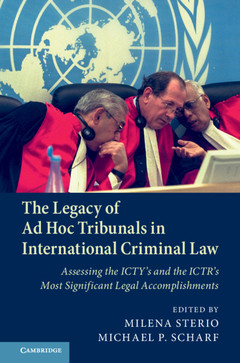Description
The Legacy of Ad Hoc Tribunals in International Criminal Law
Assessing the ICTY's and the ICTR's Most Significant Legal Accomplishments
Coordinators: Sterio Milena, Scharf Michael
Assesses the legacy and impact of the ICTY and ICTR, focusing on their most significant legal achievements in international criminal law.
Language: English
Subject for The Legacy of Ad Hoc Tribunals in International Criminal Law:
The Legacy of Ad Hoc Tribunals in International Criminal Law
Publication date: 02-2019
Support: Print on demand
Publication date: 02-2019
Support: Print on demand
The Legacy of Ad Hoc Tribunals in International Criminal Law
Publication date: 02-2019
300 p. · 16x23.7 cm · Hardback
Publication date: 02-2019
300 p. · 16x23.7 cm · Hardback
Description
/li>Contents
/li>Biography
/li>
In the post-Nuremberg era two of the most important developments in international criminal law are the International Criminal Tribunal for Yugoslavia (ICTY) and the International Criminal Tribunal for Rwanda (ICTR). Created through UN Security Council resolutions, with specific mandates to prosecute those responsible for serious violations of international humanitarian law, the ICTY and the ICTR played crucial roles in the development of international criminal law. Through a series of chapters written by leading authorities in the field, The Legacy of Ad Hoc Tribunals in International Criminal Law addresses the history of the ICTY and the ICTR, and the important aspects of the tribunals' accomplishments. From examining the groundwork laid by the ICTY and the ICTR for greater international attention to crimes against humanity to the establishment of the International Criminal Courts, this volume provides a comprehensive overview of the impact and lasting roles of these tribunals.
Introduction Michael P. Scharf and Milena Sterio; Part I. The Legacy of the Yugoslavia and Rwanda Tribunals: 1. The Yugoslavia and Rwanda tribunals: a legacy of human rights' protection and contribution to international criminal justice Milena Sterio; 2. Examining the benchmarks by which to evaluate the ICTY's legacy Jennifer Trahan; Part II. Normative and Operational Legacy of the Yugoslavia and Rwanda Tribunals: 3. How the Tadic appeals chamber decision fundamentally altered customary international law Michael P. Scharf; 4. A roundtable on the legacy of the Karadzic trial at the International Criminal Tribunal for the Former Yugoslavia ILW 2016 Panel; 5. Atrocity speech law comes of age: the good, the bad and the ugly of the international speech crimes jurisprudence at the ad hoc tribunals Gregory S. Gordon; 6. The once and future doctrine of joint criminal enterprise Michael P. Scharf; 7. The tribunals' fact-finding legacy Yvonne McDermott; 8. The legacy of the ICTY and ICTR on sexual and gender-based violence Valerie Oosterveld; 9. The defense of duress to killing innocents: assessing the mixed legacy of the ICTY and the ICTR Jonathan Witmer-Rich; 10. Sentencing policies of the ad hoc tribunals Yvonne M. Dutton; 11. Mixed messages: the sentencing legacy of the ad hoc tribunals Margaret M. deGuzman; 12. Combatting chaos in the courtroom: lessons from the ICTY and ICTR for the control of future war crimes trials Michael P. Scharf; Part III. Impact of the Yugoslavia and Rwanda Tribunals on the Future of International Criminal Law and Global Peace and Justice: 13. The impact of the ad hoc tribunals on the International Criminal Court Stuart Ford; 14. Twenty-four years on: the Yugoslavia and Rwanda tribunals' contributions to durable peace Paul R. Williams and Kimberly Larkin; Conclusion Michael P. Scharf and Milena Sterio.
Milena Sterio is Associate Dean and Professor of Law at the Cleveland-Marshall College of Law. She has published numerous law review articles in this field, and is the author of four books including Prosecuting Maritime Piracy (Cambridge, 2015).
Michael Scharf is Dean of the Law School and the Joseph C. Hostetler – Baker and Hostetler Professor of Law at Case Western Reserve University School of Law. Scharf, who previously served as Attorney Advisor for UN Affairs at the US Department of State, is the author of over 100 scholarly articles and seventeen books, three of which have garnered national book of the year honors.
Michael Scharf is Dean of the Law School and the Joseph C. Hostetler – Baker and Hostetler Professor of Law at Case Western Reserve University School of Law. Scharf, who previously served as Attorney Advisor for UN Affairs at the US Department of State, is the author of over 100 scholarly articles and seventeen books, three of which have garnered national book of the year honors.
© 2024 LAVOISIER S.A.S.




